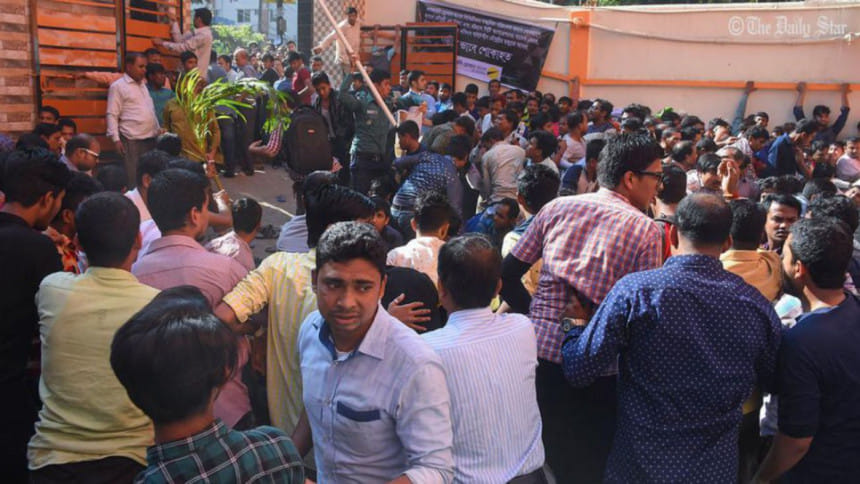Child heroism, mother's loss, deaths in stampede!

Three human stories hogged news headlines last Monday and Tuesday touching the deeper chords of our sensibilities. Evocative of mixed emotions of hope, optimism, tragedy, and callous indifference to human lives, the tales are instructive in their own ways.
On Monday, Shihabur Rahman and Titon Ali, aged six and seven respectively, warned off a goods train from derailing by waving their red mufflers in a last-minute improvisation of a danger signal short of Arni railway station at Baghabari in Rajshahi. Minutes earlier, a train had left behind a broken fishplate on the railway tracks making a big din. The sound alerting the two children to the risk facing an on-coming train, they quietly moved into action preventing an accident—some lives and assets were saved.
There is an angelic quality about what they did, true to their unspoiled innocence just past the babyhood. Leave aside that subjective attribution, in purely objective terms, the two kept their wits about them landing a feat of intelligence, imagination, courage, and a sense of responsibility—qualities, sadly becoming rarer in the adult world.
The heroics of the two minor children can be better extolled through this gem of a verse: "Whoever saves one life, saves the world entire."
Shahriar Alam, local MP and state minister for foreign affairs, has taken the two boys under his wing for their education up to the highest level, if they so wish. Rewarding good work adequately is like inspiring more of it.
In a break with the rhythm, you have Polish-British writer Joseph Conrad's words: "Men alone are capable of every wickedness." Thus, you get to see mugging coming back with new vengeance: A six-month-old fell off the lap of his rickshaw-riding mother when her handbag was being snatched away by a swooping mugger. The mother thrown off balance, the infant rolled down onto the street only to perish under the wheels of a vehicle. The mother's trauma is nerve-racking even to an observer, let alone the victim herself.
As one wise man put it, "Every death (unnatural) diminishes me as I am involved in mankind." Another sage went further, saying that every killing diminishes humanity.
In a stark contrast to such noble sentiments, we are appalled by witnessing how cheap human lives have become, how expendable they are. Ah, the deaths in stampede last Tuesday! The tragedy centred around the Qulkhwani Mezban (farewell feast) following the demise of the highly popular former Chittagong city mayor ABM Mohiuddin Chowdhury.
An extensive community feeding had been organised at 14 venues of the city. The proceedings went on normally in one but all locations—the Rima community centre. This was the only venue designated for the minority community members for whom a non-beef meal had been arranged. But it appears some crucial issues had not been properly thought through: One, the number of Hindus including other minority community members in Chittagong was large enough to call for two venues to avoid crowding.
More to the point, Rima community centre has narrow, single entrance and exit points, that too sloping with the result that people rushing in and out would have clogged the passage virtually shut. According to reports, as the guests having finished eating rushed to the only exit and pushed forward, they got trampled tumbling down the slope with one cluster of bodies falling over another on the outside. As many as ten died, and four were hospitalised, three of them in critical condition.
Ironically, three batches had been seated, fed and led away without any incident, but suddenly things went awry. Why? Mohiuddin's family reportedly suspects an act of sabotage—some young people towards the end having created some row.
What, however, exactly triggered the accident is being investigated by two teams. We expect their findings will unfailingly pinpoint the causes of this largely man-made disaster. But experts in event management, civil engineering, and architecture put the disaster down to the choice of venue—faulty construction of the community centre, single and yet narrow entry and exit points to and from the building, and above all, lack of fool-proof orchestrated event management. The policing role, too, will naturally come under focus.
We are no strangers to deaths in stampede. Poor people have died from it while collecting clothes given away as zakat. Workers of garment factories have been trampled to death or wounded as they tripped over each other rushing down the stairs on hearing the news of a fire break-out. Then, the final mangling would come as survivors tried to slouch through the single, narrow exit from the building.
Deaths in stampede are especially lamentable because they are avoidable.
Shah Husain Imam is adjunct faculty at East West University, a commentator in current affairs, and former Associate Editor, The Daily Star.
Email: [email protected]

 For all latest news, follow The Daily Star's Google News channel.
For all latest news, follow The Daily Star's Google News channel. 



Comments